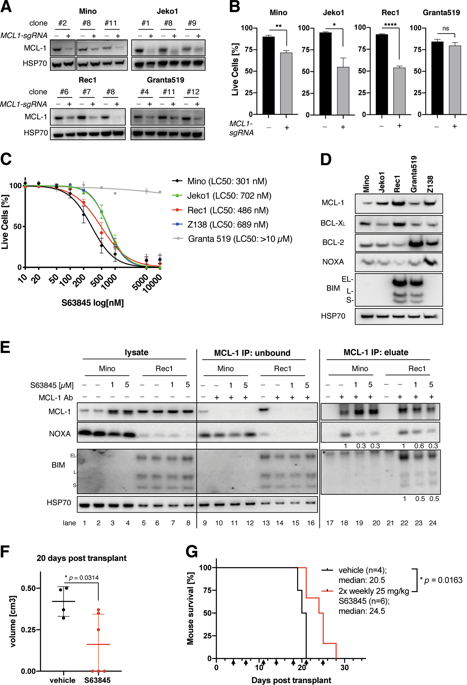Our official English website, www.x-mol.net, welcomes your feedback! (Note: you will need to create a separate account there.)
Potent efficacy of MCL-1 inhibitor-based therapies in preclinical models of mantle cell lymphoma.
Oncogene ( IF 8 ) Pub Date : 2019-11-26 , DOI: 10.1038/s41388-019-1122-x Michael A Dengler 1, 2 , Charis E Teh 1, 2 , Rachel Thijssen 1, 2 , Lahiru Gangoda 1, 2 , Ping Lan 1, 2, 3 , Marco J Herold 1, 2 , Daniel H Gray 1, 2 , Gemma L Kelly 1, 2 , Andrew W Roberts 1, 2 , Jerry M Adams 1, 2
Oncogene ( IF 8 ) Pub Date : 2019-11-26 , DOI: 10.1038/s41388-019-1122-x Michael A Dengler 1, 2 , Charis E Teh 1, 2 , Rachel Thijssen 1, 2 , Lahiru Gangoda 1, 2 , Ping Lan 1, 2, 3 , Marco J Herold 1, 2 , Daniel H Gray 1, 2 , Gemma L Kelly 1, 2 , Andrew W Roberts 1, 2 , Jerry M Adams 1, 2
Affiliation

|
Apoptosis-regulating BCL-2 family members, which can promote malignant transformation and resistance to therapy, have become prime therapeutic targets, as illustrated by the striking efficacy in certain lymphoid malignancies of the BCL-2-specific inhibitor venetoclax. In other lymphoid malignancies, however, such as the aggressive mantle cell lymphoma (MCL), cell survival might rely instead or also on BCL-2 relative MCL-1. We have explored MCL-1 as a target for killing MCL cells by both genetic and pharmacologic approaches. In several MCL cell lines, MCL-1 knockout with an inducible CRISPR/Cas9 system triggered spontaneous apoptosis. Accordingly, most MCL cell lines proved sensitive to the specific MCL-1 inhibitor S63845, and MCL-1 inhibition also proved efficacious in an MCL xenograft model. Furthermore, its killing efficacy rose on combination with venetoclax, the BCL-XL-specific inhibitor A-1331852, or Bruton's tyrosine kinase (BTK) inhibitor ibrutinib, which reduced pro-survival signals. We also tested the MCL-1 inhibitor in primary samples from 13 MCL patients, using CD40L-expressing feeder cells to model their microenvironmental support. Notably, all unstimulated primary MCL samples were very sensitive to S63845, but the CD40L stimulation attenuated their sensitivity. Mass cytometric analysis revealed that the stimulation likely conveyed protection by elevating BCL-XL and MCL-1. Accordingly, sensitivity of the CD40L-stimulated cells to S63845 was substantially restored by co-treatment with venetoclax, the BCL-XL-specific inhibitor or ibrutinib. Overall, our findings indicate that MCL-1 is very important for survival of MCL cells and that the MCL-1 inhibitor, both alone and together with ibrutinib, venetoclax or a BCL-XL inhibitor, offers promise for novel improved MCL therapies.
中文翻译:

基于 MCL-1 抑制剂的疗法在套细胞淋巴瘤临床前模型中的有效疗效。
正如 BCL-2 特异性抑制剂 venetoclax 在某些淋巴恶性肿瘤中的显着疗效所说明的那样,可以促进恶性转化和对治疗的抵抗的细胞凋亡调节 BCL-2 家族成员已成为主要的治疗靶点。然而,在其他淋巴恶性肿瘤中,例如侵袭性套细胞淋巴瘤 (MCL),细胞存活可能替代或依赖于 BCL-2 相关的 MCL-1。我们已经探索了 MCL-1 作为通过遗传和药理学方法杀死 MCL 细胞的靶标。在几个 MCL 细胞系中,用可诱导 CRISPR/Cas9 系统敲除 MCL-1 会引发自发性细胞凋亡。因此,大多数 MCL 细胞系被证明对特定的 MCL-1 抑制剂 S63845 敏感,并且 MCL-1 抑制在 MCL 异种移植模型中也被证明是有效的。此外,与 venetoclax、BCL-XL 特异性抑制剂 A-1331852 或布鲁顿酪氨酸激酶 (BTK) 抑制剂依鲁替尼联合使用后,其杀伤效果提高,从而降低了促生存信号。我们还在 13 名 MCL 患者的原始样本中测试了 MCL-1 抑制剂,使用表达 CD40L 的饲养细胞来模拟他们的微环境支持。值得注意的是,所有未受刺激的原发性 MCL 样本对 S63845 都非常敏感,但 CD40L 刺激减弱了它们的敏感性。质谱分析表明,刺激可能通过提升 BCL-XL 和 MCL-1 来传递保护。因此,CD40L 刺激的细胞对 S63845 的敏感性通过与 venetoclax、BCL-XL 特异性抑制剂或依鲁替尼共同治疗而基本恢复。总体,
更新日期:2019-11-27
中文翻译:

基于 MCL-1 抑制剂的疗法在套细胞淋巴瘤临床前模型中的有效疗效。
正如 BCL-2 特异性抑制剂 venetoclax 在某些淋巴恶性肿瘤中的显着疗效所说明的那样,可以促进恶性转化和对治疗的抵抗的细胞凋亡调节 BCL-2 家族成员已成为主要的治疗靶点。然而,在其他淋巴恶性肿瘤中,例如侵袭性套细胞淋巴瘤 (MCL),细胞存活可能替代或依赖于 BCL-2 相关的 MCL-1。我们已经探索了 MCL-1 作为通过遗传和药理学方法杀死 MCL 细胞的靶标。在几个 MCL 细胞系中,用可诱导 CRISPR/Cas9 系统敲除 MCL-1 会引发自发性细胞凋亡。因此,大多数 MCL 细胞系被证明对特定的 MCL-1 抑制剂 S63845 敏感,并且 MCL-1 抑制在 MCL 异种移植模型中也被证明是有效的。此外,与 venetoclax、BCL-XL 特异性抑制剂 A-1331852 或布鲁顿酪氨酸激酶 (BTK) 抑制剂依鲁替尼联合使用后,其杀伤效果提高,从而降低了促生存信号。我们还在 13 名 MCL 患者的原始样本中测试了 MCL-1 抑制剂,使用表达 CD40L 的饲养细胞来模拟他们的微环境支持。值得注意的是,所有未受刺激的原发性 MCL 样本对 S63845 都非常敏感,但 CD40L 刺激减弱了它们的敏感性。质谱分析表明,刺激可能通过提升 BCL-XL 和 MCL-1 来传递保护。因此,CD40L 刺激的细胞对 S63845 的敏感性通过与 venetoclax、BCL-XL 特异性抑制剂或依鲁替尼共同治疗而基本恢复。总体,


























 京公网安备 11010802027423号
京公网安备 11010802027423号